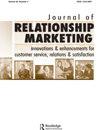感知品牌关系导向:概念分析与维度识别
Q2 Business, Management and Accounting
引用次数: 0
摘要
摘要关于感知品牌关系取向的文献由于对这一概念的非自愿指定而难以整合。此外,这一概念的全球一维操作很难推断出管理含义。然后,本研究旨在(1)加深对感知品牌关系取向的概念理解,并将其与共识和整合的定义联系起来;(2)通过使用23个半结构化访谈和两个焦点小组的定性研究,确定其不同维度。因此,感知品牌关系取向下降为六个反射维度:(1)在关系沟通中努力,(2)在身体和心理上努力,(3)努力营造温暖的氛围,(4)努力追求利益的互惠,(5)努力不断创新,(6)努力个性化。因此,建议不要将感知的品牌关系取向概念化为一维的全球感知,而是从品牌关系取向的角度,利用其多个维度来根据消费者的期望调整品牌战略。本文章由计算机程序翻译,如有差异,请以英文原文为准。
Perceived Brand Relationship Orientation: Conceptual Analysis and Dimensions Identification
Abstract The literature on Perceived brand relationship orientation cannot be easily integrated due to the non-consensual designation of this concept. Moreover, managerial implications can hardly be deduced with the global unidimensional operationalizations of this concept. Then, the present research aims at (1) deepening the conceptual understanding of Perceived brand relationship orientation and associating it with a consensual and integrative definition, and (2) identifying its different dimensions through a qualitative study which used 23 semi-structured interviews and two focus groups. As result, Perceived brand relationship orientation declines into six reflexive dimensions: (1) Endeavor in relational communication, (2) Endeavor in physical and psychological proximity, (3) Endeavor to create a warm atmosphere, (4) Endeavor directed toward the mutuality of benefits, (5) Endeavor in continuous innovation, and (6) Endeavor in personalization. Therefore, it is recommended to move away from conceptualizing Perceived brand relationship orientation as a one-dimensional global perception and to exploit its multiple dimensions to adjust brand’s strategy to consumers’ expectations in term of brand relationship orientation.
求助全文
通过发布文献求助,成功后即可免费获取论文全文。
去求助
来源期刊

Journal of Relationship Marketing
Business, Management and Accounting-Marketing
CiteScore
10.20
自引率
0.00%
发文量
7
期刊介绍:
The Journal of Relationship Marketing is a quarterly journal that publishes peer-reviewed (double-blind) conceptual and empirical papers of original works that make serious contributions to the understanding and advancement of relationship and marketing theory, research, and practice. This academic journal is interdisciplinary and international in nature. Topics of interest (not limited to): Evolution and life cycle of RM; theoretical and methodological issues in RM; types of RM, networks and strategic alliances; internal communication, quality, trust, commitment, satisfaction, loyalty, and dissolution in RM; applications of RM in different disciplines and industries; international perspectives in RM; RM strategies in services economy, higher education, and e-commerce; RM, technology, and the Web; profitability and RM; case studies and best practices in RM. If you are interested in becoming an ad-hoc reviewer, please e-mail a brief statement indicating your area of expertise and interest along with a copy of your CV.
 求助内容:
求助内容: 应助结果提醒方式:
应助结果提醒方式:


